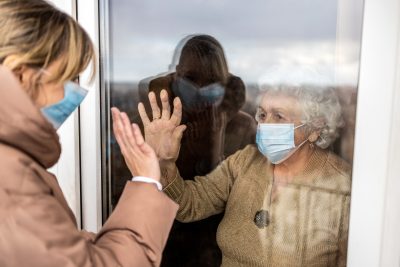Finding
 New research shows the pandemic deepened feelings of loneliness, anxiety, and depression for many older adults and their caregivers. Social connection is the “medicine hiding in plain sight.”
New research shows the pandemic deepened feelings of loneliness, anxiety, and depression for many older adults and their caregivers. Social connection is the “medicine hiding in plain sight.”
Issue 43 of Today’s Research on Aging, Safer but Alone: How COVID-19 Protections Affected Older Adults’ Mental Health, was written by Mark Mather and Paola Scommegna of the Population Reference Bureau (PRB).
During the early weeks of the COVID-19 pandemic, it became clear that older Americans faced a higher risk of serious illness and death from infection. As COVID-19 spread rapidly across the country, public health officials focused on containing the virus through unprecedented restrictions on travel and social gatherings. Many older adults were isolated from their families, friends, and caregivers to protect them from the disease.
But protecting older adults’ physical health came at a cost. Researchers have linked prolonged social isolation and loneliness to serious physical and mental health issues, including high blood pressure, heart disease, obesity, a weakened immune system, anxiety, depression, cognitive decline, Alzheimer’s disease, and even death.1
Four years after the pandemic’s onset, new research is starting to uncover the effects of social isolation on the mental health of older Americans. This report summarizes key findings by researchers who, with the support of the National Institute on Aging (NIA), studied the impact of the pandemic on the mental health of older adults and their caregivers. The results can help health officials make informed decisions in the event of another public health emergency—and deliver better care to the millions of older adults dealing with lingering mental health issues from the pandemic.
